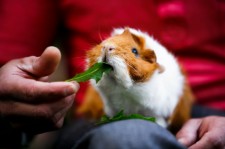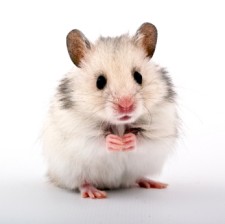Small Furries

Chinchilla
Chinchillas are squirrel like rodents, available in 2 varieties. They are clean animals with no body odour.
They should be kept in a wire cage away from sunlight and noise, plastic should not be kept in the cage as they will gnaw at anything to exercise their constantly growing teeth. Only place hard materials such as wood and pumice stone in the cage for it to chew on. Also in the cage should be some bedding (white pine shavings), sleeping quarters, some branches for climbing, a hayrack, water bottle and a dust container. As chinchillas hate water they take dry baths to remove excess oils from the fur. Dust should be available from your pet shop.
Chinchillas are vegetarians, surviving on special food pellets, hay and fresh water. They can be very frightened by noise or rough handling, and when frightened emit a pungent odour like skunks.
Popular Names
‘Ch’ names prove popular with ‘Chilli’ coming out top closely followed by ‘Chinny’, ‘Chester’, ‘Che-Che’ and ‘Cha-Cha’ or should that be Char-Char-Char! ‘Gizmo’ and ‘Gremlin’ still remain popular with all those who remember the 80’s.
Gerbil
Gerbils are intelligent, sociable animals that are best kept in pairs. They should be handled daily and they will be affectionate to you, make sure you wash your hand before handling them to avoid passing germs to them, also keep an eye on any other pets you have.
They like to keep themselves occupied in a large wire cage. This should be lined with bedding and cleaned twice a week. To keep them busy and stimulated their cage should be full of toys and challenges. They also love tubes to run through and chew on.
You will be able to find pre-mixed food for your gerbil in pet stores for a well-balanced diet. This can also be supplemented with sunflower seeds, vegetables and nuts. Fresh water should be provided daily. A sterilized bone or twig should be provided for them to chew on.
Popular Names
Flavours feature strongly in Gerbil names but lean more towards spices with ‘Ginger’, ‘Cinnamon’ and ‘Nutmeg’ all being popular. Black Gerbils have given us ‘Black Beauty’ and the top gerbil name ‘Shadow’. The most unusual names we’ve seen are the more gothic pairing of ‘Vlad’ and ‘Mina’.
 Guinea Pig
Guinea Pig
The Guinea pig is a sociable and companionable animal and loves attention. It is a very vocal animal with several different sounds.
They should be kept indoors with a secure cage. The cage should be kept clean and bedding changed regularly. Food pellets are available for guinea pigs, but their diet should be supplemented with fresh fruit, hay and water. Make sure that fresh food is changed daily and kept separate from the pellets. It will also appreciate chewing toys like all rodents do.
Signs of illness can include runny nose and eyes, excessive salivating, diarrhoea, skin disease and loss of appetite, they are also prone to shock and dehydration. Guinea pigs should be groomed, long hair should be trimmed and their nails should be clipped.
Popular Names
Guinea Pigs are often named in two’s and some duos we’ve seen include ‘Del and Rodney’, ‘Ant and Dec’ and ‘Starsky and Hutch’. We’ve also had a rather posh ‘Port and Stilton’ though the most popular duo continues to be ‘Bubble and Squeak’.
And the most unusual? Mazel and Tov ... cheers!
 Hamster
Hamster
Syrian hamsters are solitary and although they live together as babies as they grow they will develop their solitary instincts. They will not usually tolerate the company of another hamster once they reach 6-10 weeks old. Fighting between hamsters usually happens at night when the hamsters are most active and so often goes unnoticed until serious injury or even death occurs.
The golden rule for Syrian hamsters is therefore one hamster, one cage.
Dwarf Hamsters
Dwarf hamsters are sociable and will usually live happily in pairs or groups. Different species of dwarf hamsters should not be housed together as they have very different temperaments and do not inhabit the same areas in the wild. Although hamsters chosen to live together need not be from the same litter it is better if they are roughly the same age and size.
Hamsters are busy animals that love exercise and play. A large metal cage should be used with an exercise wheel, tubes for tunnelling and clean shavings for bedding. The bedding should be changed every day to stop any smells forming. They also love to chew so wooden blocks are also a good idea to keep in the cage.
A drinking bottle should be provided, with the water changed every day, it is also best check that the ball in the water bottle works often to stop your hamster getting dehydrated.
Hamsters like a good diet, with seed bells and blends of grains. They may also like fresh vegetables and fruits.
Popular Names
Flavours are again a popular choice. We see quite a few ‘Strawberries’ and ‘Toffees’ and the occasional ‘Fudge’. For white hamsters ‘Snowy’, ‘Snowball’ and ‘Snowflake’ remain favourites with ‘Hammy’ and ‘Harry’ still being the most popular hamster names overall.
The most unusual name we’ve seen ... Achilles.
Rats and mice
Both rats and mice are relatively short-lived animals but provide good companionship during their lives.
They should be kept in a large cage with plenty of room. An area for them to retreat to and a place for exercise should be provided. Rats, in particular like to burrow so bedding should be plentiful. It should be changed 2 to 3 times a week. The cage should be kept in an area that is well lit, ventilated and away from excessive noise and stresses.
Specialist food can be bought from pet stores for your rats or mice though this can be supplemented with fresh fruit and vegetables, non-fat yoghurt and whole-wheat bread. Grass hay or hay block should always be available along with fresh water, which should be changed daily.
Popular Names
Rat names tend to be quite regal with ‘Duchess’, ‘Ruby’ and ‘Princess’ all popular choices. ‘Angel’ comes out as the favourite name though food names again feature strongly with ‘Cookie’, ‘Oreo’ and ‘Crumble’, we even see an ‘Onion’.
Mice share the top name of ‘Angel’ though ‘Mickey’ and ‘Minnie’ are stll very popular.
Excellent advice is available from www.britishassociationofrodentologists.co.uk a website dedicated to the promotion of healthcare for rodents.




